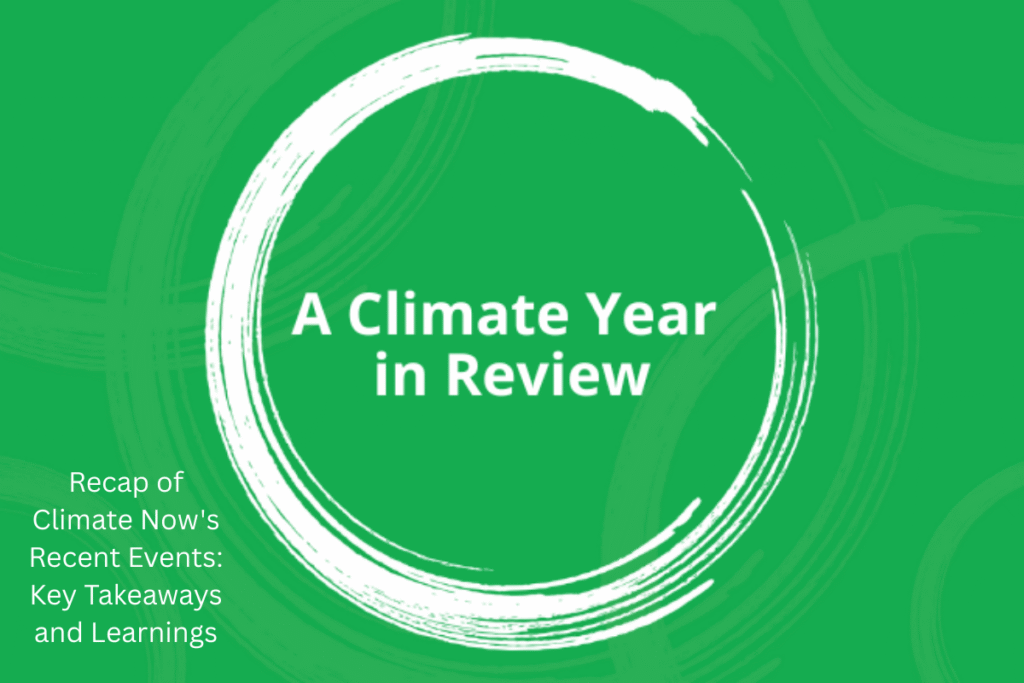
At Climate Now Events, we strive to create platforms that foster collaboration, innovation, and actionable climate solutions. Our recent events have brought together thought leaders, policymakers, scientists, and industry professionals to address the pressing climate challenges of today and tomorrow.
In this article, we recap some of the key takeaways and learnings from Climate Now’s recent events and explore how these insights are shaping the global conversation on climate change, sustainability, and climate action.
1. Renewed Focus on Climate Adaptation
One of the most powerful themes emerging from our recent events was the urgency of climate adaptation. With the world already experiencing the impacts of climate change, experts highlighted the need for resilience-building strategies, particularly in vulnerable regions. Key discussions included:
- Flood and drought resilience strategies
- Climate-resilient infrastructure for cities
- Water conservation and agriculture adaptation
Takeaway: Adaptation and mitigation must go hand in hand. Without robust adaptation strategies, even the best mitigation efforts will fall short.
2. Innovations in Renewable Energy Technologies
Another highlight was the growing momentum for renewable energy technologies. Experts from various sectors discussed solar, wind, and green hydrogen, emphasizing their role in transitioning away from fossil fuels. Technological breakthroughs were showcased, including:
- Floating wind turbines for offshore energy generation
- Perovskite solar cells offering lower-cost, higher-efficiency solar power
- The potential of green hydrogen in decarbonizing hard-to-abate sectors
Takeaway: Innovation in renewable energy technologies is accelerating, but scaling them to meet global energy demands remains a challenge.
3. The Role of Policy in Accelerating Climate Action
At every Climate Now event, discussions around climate policy were a central theme. National and global policies were examined for their effectiveness in driving the climate agenda forward. Topics included:
- The progress of the Paris Agreement and how nations are meeting their commitments
- The need for carbon pricing and green finance
- Climate policies that incentivize businesses to adopt sustainable practices
Takeaway: Strong, enforceable climate policies are essential for creating the necessary incentives for both governments and businesses to act boldly and urgently.
4. The Importance of Collaboration Across Sectors
Another key takeaway from the events was the importance of cross-sector collaboration. With so many stakeholders in the climate conversation—governments, NGOs, corporations, and local communities—no single entity can address climate change alone. The focus on multi-stakeholder collaboration emphasized:
- Public-private partnerships in climate finance
- Collaboration between cities and businesses to create sustainable supply chains
- The role of NGOs in local community engagement and awareness campaigns
Takeaway: Collaboration across sectors is key to solving the complex challenges posed by climate change.
FAQs About Climate Now’s Recent Events
1. What are the key themes from Climate Now’s recent events?
Key themes include climate adaptation, renewable energy innovations, climate policy, and cross-sector collaboration.
2. How can businesses get involved in the conversations at these events?
Businesses can participate by attending events, collaborating with other stakeholders, and sharing their innovations, sustainable practices, and commitments to climate action.
3. Can I access the content from past Climate Now events?
Yes, recorded sessions and event highlights are often available on the Climate Now website for attendees and interested individuals.
4. What is the impact of renewable energy technology on the future?
Renewable energy technologies are key to reducing global reliance on fossil fuels. Innovations like floating wind turbines and green hydrogen offer exciting potential for clean energy solutions.
5. How do climate policies influence the fight against climate change?
Climate policies, such as carbon pricing and green finance, create the right incentives for industries to reduce emissions and invest in sustainable technologies.
